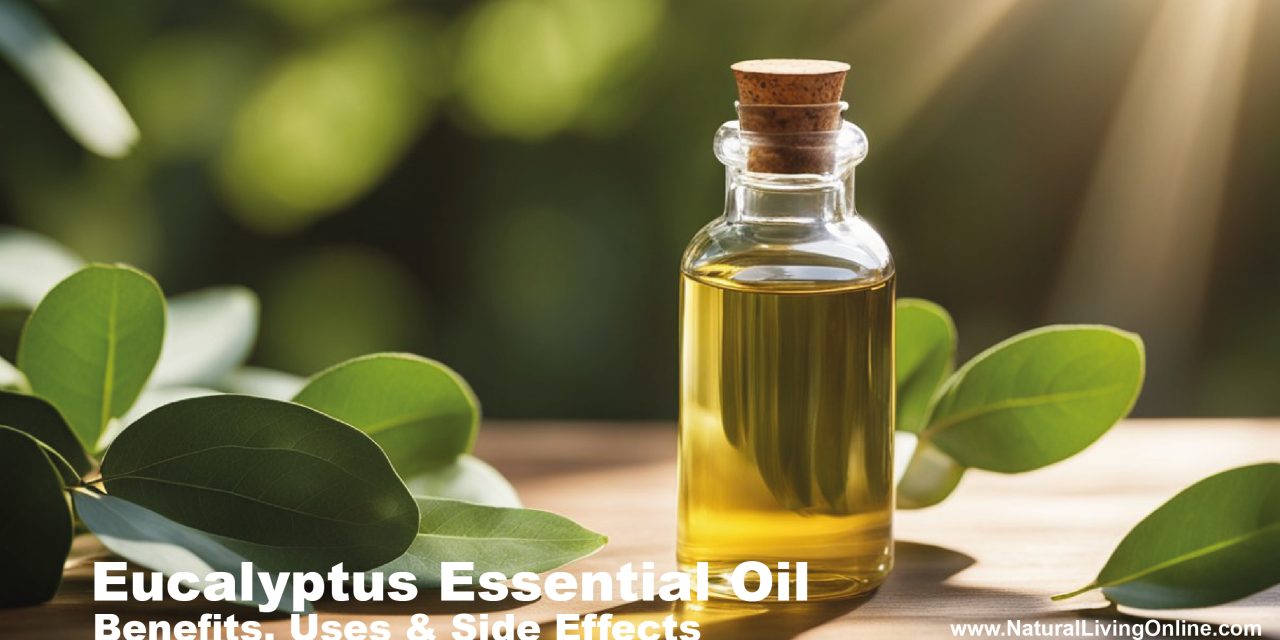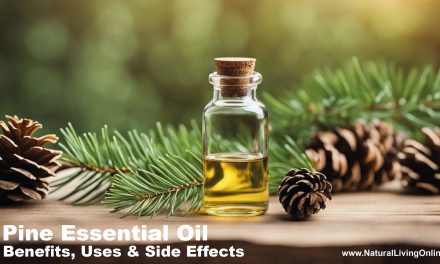Eucalyptus essential oil, a highly aromatic oil extracted from the leaves of the eucalyptus tree, has made its mark in the realm of alternative medicine due to its various potential health benefits. Its use spans from traditional remedies to modern aromatherapy, primarily recognized for its respiratory benefits and ability to soothe discomfort. Known for its distinct, pungent aroma, this oil contains compounds with potent properties that could serve multiple purposes, from medicinal to therapeutic applications.
While the therapeutic uses and health benefits make eucalyptus essential oil a popular choice, it is not devoid of side effects and precautions that need to be taken seriously. The oil should be used with care, as improper use can lead to adverse reactions. Dilution before application and consultation with healthcare providers is recommended, especially for those with certain health conditions or those using it in the presence of young children. In parallel to anecdotal benefits, ongoing scientific research investigates the full extent and validity of the purported health claims associated with eucalyptus essential oil.
Key Takeaways
- Eucalyptus essential oil is recognized for its potential to alleviate respiratory issues and provide comfort.
- Misuse of eucalyptus oil can lead to side effects, emphasizing the need for caution and proper dilution when used.
- Ongoing scientific research aims to substantiate the anecdotal evidence surrounding the efficacy of eucalyptus oil.
Essential oil profile
Botanical Name: Eucalyptus globulus (most common species for essential oil production)
Common Names: Blue Gum, Tasmanian Blue Gum
Plant Family: Myrtaceae
Countries of Origin: Native to Australia, but also cultivated in other regions with suitable climates such as China, India, and South Africa.
Extraction Method: Eucalyptus essential oil is typically extracted through steam distillation of the leaves and twigs.
Parts Used: Leaves, sometimes twigs
Essential Oil Smell: Eucalyptus essential oil has a strong, fresh, and camphoraceous aroma with hints of woodiness and earthiness.
Essential Oil Color: Clear to pale yellow.
Viscosity: Thin
Perfumery Note: Top Note
Strength of Aroma: Strong
Blends Well With
- Citrus oils like lemon and bergamot
- Mint oils such as peppermint and spearmint
- Woody oils like cedarwood and pine
- Herbal oils like rosemary and lavender
Therapeutic Properties
- Decongestant
- Expectorant
- Antimicrobial
- Anti-inflammatory
- Analgesic (pain-relieving)
- Stimulant
Uses
- Respiratory Health: Eucalyptus oil is commonly used to relieve congestion and clear the respiratory tract. It’s often added to inhalants, vapor rubs, and steam baths.
- Massage: Diluted eucalyptus oil is used in massage oils and balms to soothe sore muscles and joints.
- Cleaning: Due to its antimicrobial properties, eucalyptus oil is used in natural household cleaners and disinfectants.
- Aromatherapy: The invigorating scent of eucalyptus oil is used in aromatherapy to promote alertness, focus, and mental clarity.
Contraindications
- Eucalyptus oil should not be ingested as it can be toxic when consumed in large quantities.
- It should be used with caution around young children and infants, as it can cause respiratory distress if inhaled in excessive amounts.
- Individuals with asthma or other respiratory conditions should avoid inhaling concentrated eucalyptus oil vapor.
Side Effects
- In some individuals, eucalyptus oil may cause skin irritation or allergic reactions. It’s recommended to perform a patch test before using it topically.
- Direct contact with undiluted eucalyptus oil may cause irritation or burning sensation on the skin.
- Inhalation of eucalyptus oil vapor in large amounts can lead to nausea, headache, or dizziness.
Types
- There are many species of eucalyptus trees, but Eucalyptus globulus is the most commonly used for essential oil production. Other species like Eucalyptus radiata and Eucalyptus citriodora also produce essential oils with similar properties but different aroma profiles.
Chemical Constituents with Percentages
- The chemical composition of eucalyptus essential oil can vary, but it typically contains high concentrations of the following constituents:
- 1,8-cineole (also known as eucalyptol) (60-75%)
- Alpha-pinene (5-15%)
- Limonene (1-10%)
- Alpha-terpineol (1-5%)
- Globulol (1-5%)
The exact percentages may vary depending on factors such as the plant’s growing conditions and the extraction method used.
History and Origin of Eucalyptus Oil

Eucalyptus oil is extracted from the leaves of the eucalyptus tree, primarily Eucalyptus globulus, commonly known as the blue gum tree. Originating in Australia, this tree is a significant part of the country’s botanical landscape and holds considerable cultural importance.
The Indigenous Australians were the first to discover the healing properties of the eucalyptus leaves. They used them for everything from wound healing to fever reduction. Historical evidence suggests that traditional Aboriginal medicinal practices included the use of eucalyptus leaves long before European settlement.
- Extraction Process:
- The oil is distilled from the leafy material of the eucalyptus tree.
- Oil is obtained through a process of steam distillation, which preserves the integrity of the bioactive compounds.
Eucalyptus trees quickly spread across the world once the healing properties of the oil became known internationally. Today, eucalyptus oil is globally recognized for its numerous benefits, including its antimicrobial properties and its utility as a decongestant when inhaled.
Cultivation of eucalyptus expanded globally in the 18th and 19th centuries, as countries with similar climates to Australia began to grow eucalyptus trees for their wood, oil, and as a natural method for swamp drainage to reduce malaria.
By discovering the power of eucalyptus oil, humanity tapped into a natural resource that not only treated various ailments but also played a role in the development of new agricultural practices and industries.
Benefits of Eucalyptus Essential Oil
Eucalyptus essential oil is celebrated for its various health benefits, particularly in supporting respiratory health, enhancing skin care, providing pain relief, and boosting the immune system.
Respiratory Health
Eucalyptus essential oil plays a significant role in maintaining respiratory health. It contains compounds that are thought to help alleviate symptoms of cough, asthma, bronchitis, sinusitis, and even the common cold or flu. Inhalation of this oil can help soothe the respiratory tract, easing breathing and providing relief from congestion.
Skin Care
The oil is also lauded for its use in skin care. Eucalyptus has natural antimicrobial and antiseptic properties making it an ideal component for topical applications to treat minor wounds, ulcers, and acne. Its anti-inflammatory properties can reduce redness and irritation, promoting a healthy, glowing complexion.
Pain Relief and Anti-Inflammatory
Eucalyptus essential oil is commonly used for its anti-inflammatory properties and effectiveness in pain relief. When applied topically, it may help to reduce muscle pain, soreness, and swelling. As an anti-inflammatory agent, it serves as a natural remedy for people suffering from conditions like rheumatism and arthritis.
Immune System Boost
Finally, eucalyptus essential oil is recognized for its potential to bolster the immune system. Its antioxidant components contribute to the body’s defense against harmful organisms. Regular use, especially through aromatherapy, might reinforce the body’s ability to fight off seasonal allergies and infections, thereby providing a natural boost to immune health.
Common Uses of Eucalyptus Oil
Eucalyptus essential oil has found its place in various sectors, ranging from medicinal applications to household cleaning. It is appreciated for its clear, sharp aroma and its ability to blend with other products.
Aromatherapy
In the realm of aromatherapy, eucalyptus oil is commonly used to promote a sense of mental clarity and to help with respiratory issues. It is often added to a diffuser to create an invigorating atmosphere, helping to clear nasal passages and support overall respiratory health.
Topical Applications
For topical applications, eucalyptus oil is typically diluted with a carrier oil and used in ointments and creams. It’s known for its antiseptic properties and is utilized to aid in wound healing. Additionally, it can also provide relief from muscle and joint pain when massaged into the skin.
Household Uses
The oil’s robust antibacterial and antiseptic qualities make it a favored choice for household uses. It is included in homemade cleaning agents, added to laundry for a fresh scent, and used as a natural insect repellent. Some toothpaste formulations also integrate eucalyptus oil for its fresh taste and breath-freshening properties.
Side Effects and Precautions

While eucalyptus essential oil is esteemed for its aromatic and medicinal properties, it’s crucial to be aware of its side effects and necessary precautions to ensure safety during usage.
Usage Precautions
- Children: Eucalyptus oil should be used with extreme caution in children due to potential toxicity. Ingestion of small amounts can be dangerous.
- Pregnancy and Breastfeeding: Insufficient evidence exists regarding the safety of eucalyptus oil during pregnancy or breastfeeding, thus it’s best avoided.
- Surgery: As eucalyptus oil might affect blood sugar levels, they recommend discontinuing use at least two weeks before a scheduled surgery.
- Medications: Consult with a healthcare provider before using eucalyptus oil, as it can interact with certain medications.
Side Effects
- Toxicity: Inappropriate use, especially ingestion, can lead to toxicity.
- Irritation: Topical application can cause irritation of the skin and mucous membranes.
- Blood Sugar: Eucalyptus oil might affect blood sugar levels.
- Gastrointestinal Issues: Overuse can lead to nausea, vomiting, and diarrhea.
- Allergic Reactions: Allergies, including symptoms like dizziness and shortness of breath, may occur in sensitive individuals.
Using eucalyptus essential oil responsibly entails staying informed about potential side effects and adhering to recommended precautions, particularly for vulnerable groups like children and those who are pregnant or undergoing surgery.
Scientific Research and Evidence
Recent studies have highlighted the potential health benefits of eucalyptus essential oil, including its anti-inflammatory, antibacterial, antimicrobial, and antioxidant properties. A key component of eucalyptus oil is eucalyptol, also known as 1,8-cineole, which is responsible for much of its medicinal effects.
- Anti-inflammatory Effects: Research has shown that eucalyptus oil’s ability to reduce inflammation may be linked to mechanisms involving neutrophils. It is also suggested for the relief of symptoms associated with chronic obstructive pulmonary disease (COPD).
- Antimicrobial and Antifungal Properties: Inhalation devices utilizing eucalyptus oil demonstrated efficacy in killing bacteria and fungi, suggesting its use as a home remedy for certain fungal infections.
- Antibacterial and Antioxidant: The antibacterial and antioxidant capabilities of eucalyptus oil are promising for alternative medicinal uses.
However, users should be aware of potential side effects, which can include skin irritation and toxic effects, especially when used inappropriately or in excessive amounts. Due caution is advised, particularly in children, as adverse effects can be severe. The oil’s effectiveness and safety continue to be investigated, substantiating traditional knowledge with scientific methods. It remains popular as part of alternative and complementary therapies.
Frequently Asked Questions
What are the common benefits of using eucalyptus essential oil?
Eucalyptus essential oil is often used to help relieve symptoms of respiratory conditions due to its anti-inflammatory and antimicrobial properties. It’s also known for its ability to stimulate immunity, provide antioxidant protection, and improve the overall well-being.
How can eucalyptus essential oil be used for skin care?
For skin care, eucalyptus essential oil may be used as an antiseptic due to its germicidal qualities. It can be diluted with a carrier oil and applied topically to help treat wounds, ulcers, and acne.
Are there any safety concerns when inhaling eucalyptus essential oil?
Inhalation of eucalyptus essential oil must be done with care. Direct inhalation of the undiluted oil can potentially lead to coughing, wheezing, or worsening of asthma symptoms in some individuals.
Can eucalyptus essential oil be applied to the feet, and if so, what are the anticipated benefits?
Applying diluted eucalyptus essential oil to the feet is believed to soothe pain and reduce inflammation. It can offer a cooling sensation and benefit those with foot odor issues, athlete’s foot, or sprains due to its antifungal and antibacterial qualities.
What are the potential side effects of using eucalyptus essential oil?
Some individuals may experience allergic reactions to eucalyptus essential oil, including skin irritation, headaches, and nausea when used excessively or if improperly diluted.
Are there any known interactions between eucalyptus essential oil and medications?
Eucalyptus essential oil may interact with certain medications, such as those metabolized by the liver’s cytochrome P450 system. Caution is advised when using the oil alongside other medications, and guidance from healthcare professionals is recommended.
References
A review on therapeutics application of eucalyptus oil
Eucalyptus essential oil as natural pesticide
This website does not provide medical advice.
All information provided on this website, and on associated social media networks, including but not limited to texts, images, and numbers are for general information purpose only. It is not intended as medical advice and it does not include all possible precautions, side effects, or interactions that may occur. Neither NaturalLivingOnline.com nor its author/founder take responsibility for how you use this information. Statements contained on NaturalLivingOnline.com have not been evaluated by the FDA. You should conduct thorough research via multiple sources and consult your physician or qualified doctor before using any essential oil or herbal remedy. Information on NaturalLivingOnline.com must not be relied upon for medical, legal, financial or other decisions.













